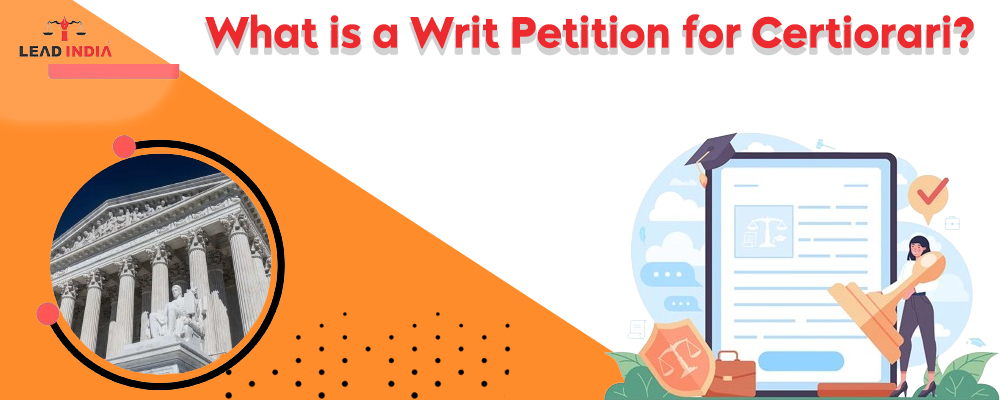Many rights are granted to Indian citizens by the Constitution. One of the most crucial things for Indian citizens’ moral and intellectual development is their fundamental rights. Part III of the Indian Constitution enumerates the rights to equality, freedom, safeguarding from exploitation, freedom of religion, rights to culture and education, as well as access to constitutional remedies. Just putting these rights in the constitution and granting them to Indian citizens is not enough. It is imperative that these rights be upheld.
Writ Petition for Certiorari: About
- The legal term “certiorari” comes from a Latin verb that means “to be informed” or “to be certified.” A higher court can overturn an order that has already been made by lower courts, tribunals, or other public authorities by issuing a writ petition for certiorari.
- A legal tool known as the writ petition for certiorari enables higher courts to examine rulings made by subordinate courts or administrative agencies instructing them to transfer the case file in question.
Need A Legal Advice
The internet is not a lawyer and neither are you. Talk to a real lawyer about your legal issue

Writ Petition for Certiorari: Grounds to File
- Jurisdictional Error: When there are questions regarding the lower courts’ jurisdiction, that is, when they have overreached their legal authority or neglected to use it when it should have, a writ of certiorari may be requested.
- Error of Law: A party may file a writ of certiorari to rectify an alleged error of law in the lower court’s judgment, such as an improper interpretation or application of the law that led to an unfair or incorrect decision that might have serious ramifications.
- Substantial Question of Law: Must concern a significant legal issue that needs to be resolved or clarified by a higher court, such as how to interpret a constitutional provision.
- Conflicting Decisions: A writ petition for certiorari may be filed to address inconsistencies in lower courts’ rulings on a given legal matter and create a unified interpretation of the law.
- Natural Justice Violation: A writ of certiorari may be requested if the petitioner claims that the lower court proceedings violated the principle of natural justice or that elements like corruption, fraud, or collision prevented justice from being served.
- Judicial Review: Writ of Certiorari may be filed to contest administrative decisions or actions if it is thought that the lower court did not sufficiently review or oversee an administrative body’s decision.
Writ Petition for Certiorari: Filing Procedure
- Step 1: The offended party must first provide certain legal organizations or independent practitioners with necessary documents, such as identification proof, proof of residency, photos, and so forth.
- Step 2: A lawyer is then consulted in order to draft the petition. The document includes the name, address, and circumstances leading up to the violation of the aggrieved party’s fundamental rights. Indicate in detail the “prayers” or the court relief that is being requested.
- Step 3: The petition will be accepted and the opposing party will be notified by the court when it sets a hearing date.
- Step 4: After that, a date is chosen to guarantee the attendance of both parties.
- Step 5: Ultimately, the court makes a decision and grants relief following hearing arguments from both parties.
Writ Petition for Certiorari: Format
The format to file a Writ Petition for Certiorari is as follows:
Writ Petition for Certiorari: Its Impact
Certiorari significantly influences the rulings made by subordinate courts. A higher court consents to review a lower court’s ruling when it grants certiorari, such as the Supreme Court. This review may lead to various results.
- Initially, the decision made by the lower court may be upheld and allowed to stand if the higher court affirms it.
- Second, the decision made by the lower court may be reversed by the higher court, effectively overturning it and issuing a new verdict.
- Third, the case may be remanded to the lower court by the higher court for additional proceedings or reconsiderations.
In general, certiorari has the effect of giving higher courts a way to exercise their power, correct mistakes, set precedents, and guarantee uniformity in the way the law is interpreted and applied.
For any type of legal assistance, one can talk to lawyer from Lead India. Lead India provides free online legal advice in India. With Lead India, one can ask free online questions of the experts in addition to getting free legal advice.





 Talk to a Lawyer
Talk to a Lawyer